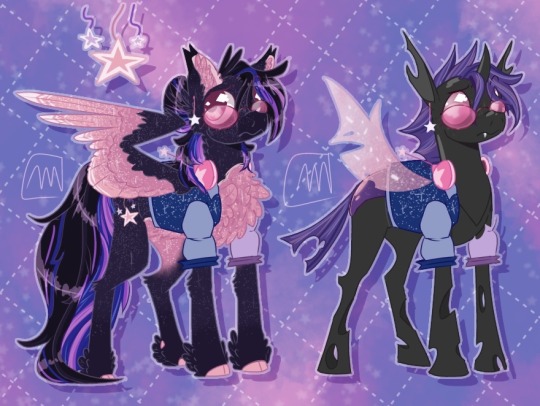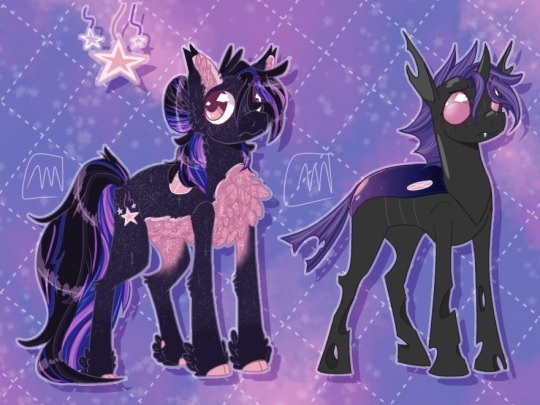#i prommy that them being a changeling makes sense for their character and it's not just bc i like changeling ocs
Text
[slowly pokes my head in] hey. hey you guys wanna see a pony.
decided to draw an oc of mine as a mlp:fim character!!! verrry very proud of it,,,


#my art#tfj#mlp#mlp fim#mlp oc#originally i made this design(or; like; a beta version of it) for an au for an oc thing with my friends like. oh wow 2 years ago h#anyway this is cez and don't look at the name too much. i prommy i am so good at coming up with names#have i shared them here before? prolly a bit...#just uhhh scroll through the tfj tag and you'll maybe find some stuff about them + others dkndkdndksjs#i prommy that them being a changeling makes sense for their character and it's not just bc i like changeling ocs#also if pharynx can look like that then i can make them pink and ourple as well#don't ask me what the cutiemark means btw idk. it's subject to change.#also i guess it doesn't really have to mean anything? 'cause it ain't real?
13 notes
·
View notes
Text
for once i WILL make a long analysis post no one asked for. p2 bad grief and his friendship with artemy below + p2 and classic changeling spoilers. let’s try to be serious about him for just a minute and forget about his giant pores and ugg boots i have no agenda i prommy
i know i’m not alone in thinking that bad grief’s relationship with his friends is one of the most interesting and telling aspects of his character in p2. for a liar, he’s extremely loyal. a lot of people have talked about how he comes through to protect rubin despite their differences, so it’s obvious how much he cares. lara also includes him in her confession, meaning she has reason to believe that he would try to give himself up to help her just as much as artemy and rubin, who it’s a lot easier to imagine doing something like that. he’s also a person constantly looking for acceptance, not by society, but by the people around him-- we learn this from his reflection, who also tells us how much artemy’s perception of him in particular matters to him.
unlike stakh and lara, he isn’t angry with artemy at any point in the story, even if artemy kills piecework, and doesn’t lash out at him even in the cathedral. he doesn’t seem particularly angry with stakh or lara either; what bothers him most is that they haven’t accepted him (“gravel-hearted lara won’t even look at me”). i think an important difference is that he’s watched stakh and lara grow up and grow away from him. the core of what distinguishes his relationship with artemy from his relationship with stakh and lara is very simply the difference between reuniting with a friend you haven’t seen in years due to them moving away or going to a different school or whatever vs a friend you’ve spent years growing apart from-- there’s no inherently saying that you’re more compatible with the separated friend (although yeah, there’s a lot to be said about artemy being the glue that held their group together), but you see them still as the person they were when they left, and there’s an instinct to jump right back in to the relationship as it was. since that’s the last you remember of them, that past is current in your memory, as opposed to being clouded by everything that came after the sort of halcyon days of youth. grief seems a lot more sentimentally attached to the gang’s past than stakh and lara. in part i think this is because he’s a childish person, but i think it’s also tied to that desire for acceptance.
when artemy shows up in grief’s nest, the first thing grief does is compare him to how he used to be-- specifically in a way that encourages denial. whether it’s an intentional choice or not, saying “you’re different now; you’ve gone soft” begs the answer “i haven’t gone soft”, with the implied “i’m not different”. similarly, through saying something along the lines of “could that be my old friend? no, you’ve changed,” grief ties artemy’s past identity to their friendship, such that engaging in their friendship is a return to youth. and there is a return to something; as much as artemy and grief trade half-insults, right from the beginning their conversations lack nearly all the tension and resentment in artemy’s early conversations with lara and stakh, and they have a good give-and-take in the way they talk to each other. there’s also a strong contrast here with artemy’s first conversation with lara, in which the first thing lara does is bring up how long he’s been gone, and stakh’s first words to him-- “why did you come? finally thought of some good excuses?” grief puts less emphasis on artemy’s absence than on hoping he’s come back, and less on how things have changed in the town than how things have changed with artemy. i’m talking a lot about it because it’s such a weird exchange, on the line between joking and heartfelt (”you’re no fun. aren’t you happy to see an old friend?” “oddly enough, i am”)
the other important thing that happens before-aglaya is their little railroad field trip. this is a weird moment. the plot itself doesn’t make a lot of logical sense as far as grief’s actions. artemy comes to grief asking to blow up the railroad tracks. grief doesn’t want to blow up the railroad tracks. grief agrees to blow up the railroad tracks, shows up to the railroad tracks, and tells artemy he’s not going to blow up the railroad tracks. and nothing really happens. the player can choose to just sit with him. if it’s a joke, it’s not very funny, and grief doesn’t seem like he’s in a joking mood. you’d kind of imagine he would just say no, or if he wants to send artemy on a wild goose chase he just wouldn’t show up. it’s not like there’s another dynamite supplier artemy would go to. for me, the explanation comes in what artemy says when he asks for the dynamite. the dialogue option that unlocks the event is “why not? let’s do it together. just like the good old days.”
aglaya is a force of maturation, a catalyst of coming-of-age. some of my friends were just talking about how in classic, she says she thinks the powers that be hated her because she wanted them to grow up. i don’t actually think this is a change with the force she represents in p2; she’s tied to a transformative stage of psychological development that deals with questioning authority and the established order of things. in p2 her power is most tangibly illustrated in her effect on bad grief.
when artemy asks, just like the good old days (and one of the ways he can ask for the dynamite is through reminiscing about their old games and saying he’s feeling sentimental), everything about grief draws him to help. he wants to help his friend, he wants to protect himself, he wants things to be like they used to. but in the shadow of inquisition, he’s starting to mature, and to realize that things can’t stay the same. he’s starting to embrace the future, and i think he wants to face that future head-on with artemy, who has basically re-accepted him, which is why he makes the plans and shows up. he can’t resist going, but he knows better than to bring the dynamite.
their relationship gets more complicated as grief moves into the cathedral. in the conversation that begins with “we need to escape, cub. escape.”, he tries to outline his new philosophy. unlike immortell, grief isn’t concerned with mortality, but with humanity, and he’s become convinced that the only way to become human is to leave-- but he doesn’t leave, because artemy doesn’t leave. he doesn’t say he needs to escape, he says they need to escape. there are two explanations i can think of for this, and i think the truth might be a combination of the two. it’s possible that on some level, he recognizes, like aglaya, that artemy is the only character with some kind of agency. the only way grief would be able to leave the town is through artemy’s agency, although in practice artemy’s agency is limited to make that impossible (no option to agree). still, artemy has what grief calls an “inner freedom”, which he both envies and admires. it’s all pretty similar to aglaya’s fascination with artemy, except more familiar. grief has always known this of artemy, he’s just starting to put it into perspective. it also seems possible to me that grief just doesn’t want to leave without artemy. he exists best in the context of others, as he deals in the web of connections between people; he isn’t one to strike out on his own. the only time we see him alone is at the signal fire by the railroad, waiting for artemy.
artemy has, gives, or represents everything grief wants and doesn’t get: acceptance, a return to youth, and freedom. in the nocturnal ending, grief outlines (if you get lucky i guess) one other thing artemy has that he doesn’t: “a good, honest face”. in the diurnal ending, artemy still struggles to understand what the fuck grief is talking about, but their relationship leaves off on a hopeful note that one day he will. idk i don’t know how to end this there’s just literally so much to think about here
84 notes
·
View notes